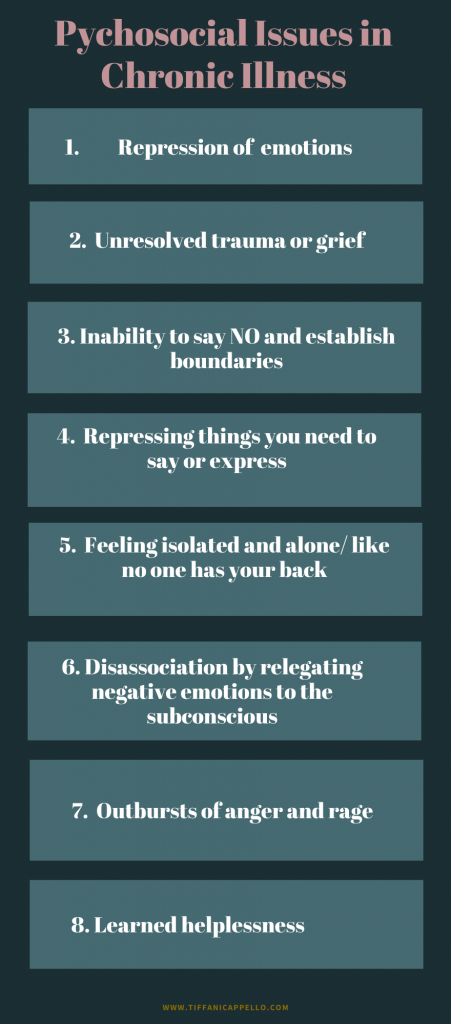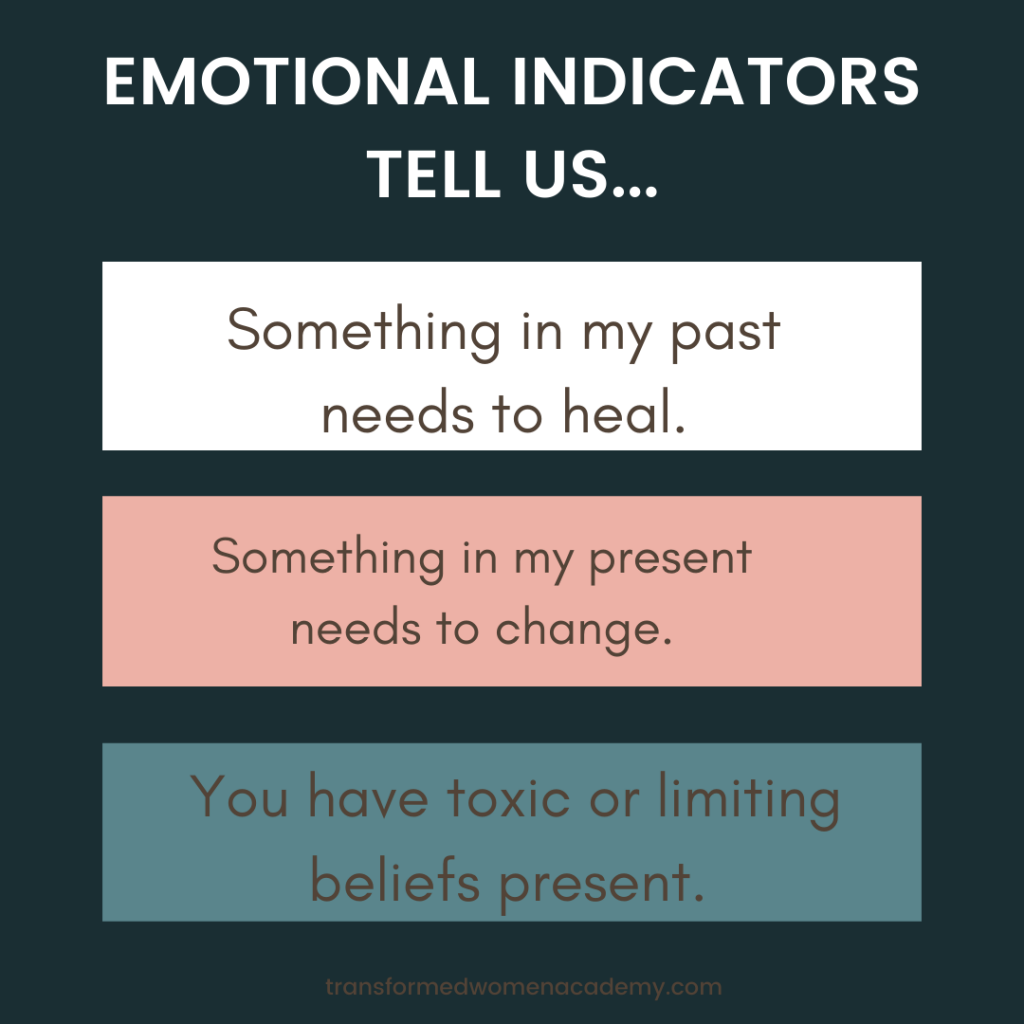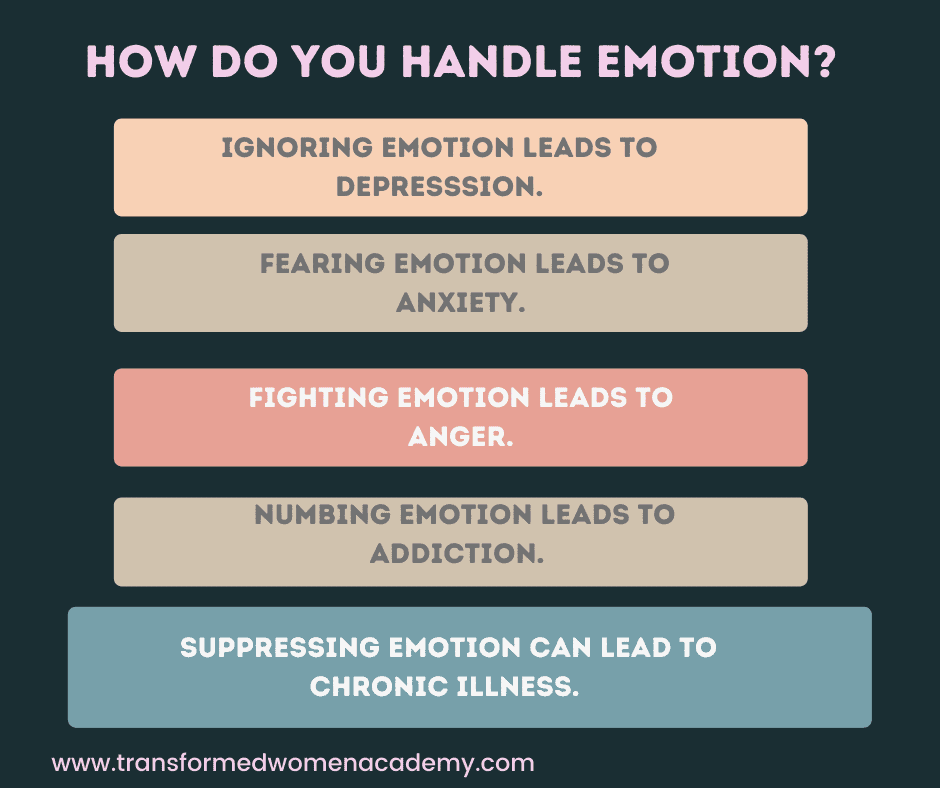Is Emotional Stress Making You Sick?
Did you know that childhood trauma, relationship difficulties, anxiety, and lack of confidence can all contribute to chronic health conditions?
In the past 20 years, levels of chronic illness and chronic pain conditions have reached epidemic proportions. Rates of autoimmune diseases, diabetes, heart disease, cancer, skin disorders, migraine headaches, and chronic pain conditions are on the rise. Making matters worse, it is estimated that over 10 million Americans are addicted to opioids to manage chronic health issues, with over 47,000 opioid related deaths per year. There has to be a better way.
The question we need to ask ourselves is… Why are these chronic illnesses and chronic pain conditions rising so rapidly?
Most people seem to believe that the numbers of chronic conditions are going up simply because of more advanced diagnostics and increased lifespan of modern humans. However paleopathologists and other anthropologists who study disease in primitive and ancient populations have stated that this is not entirely the case. These are primarily diseases of modernity and were rarely seen amongst our ancient ancestors, and these chronic conditions are increasing at a rate that is simply not sustainable. The human population is clearly degenerating.
The fact that primitive populations rarely struggled with these diseases of modernity should give us pause. We should be asking ourselves, “why”? And many researchers are asking themselves exactly this question, leading to some startling discoveries!
Of course there are many aspects of modernity that contribute to the rise in disease that we see in our modern society. No doubt environmental pollution, processed and devitalized foods, and several other factors all contribute to this growing problem.
Psychosocial Influences In Health And Disease
But in the last 50 years, medical researchers have discovered that childhood trauma, stress, and social factors related to modern lifestyles have had a huge role to play in the development of chronic illness and pain conditions.
Gabor Mate MD, in his groundbreaking book, When The Body Says No, lays the groundwork for a new understanding of how psychosocial factors can cause and contribute to human diseases. Building on the foundation of research in psychoneuroimmunology, Mate demonstrates that there are specific personality characteristics and traumatic experiences commonly found in people who struggle with chronic illness.
Now before we continue further, I want to be clear. If you are suffering from chronic pain and illness. You are not to blame. No one wakes up in the morning and decides to develop a chronic illness or decides to live with chronic pain. We all want to live healthy and happy lives. Unfortunately most people who suffer from chronic pain and illness have been subjected to toxic levels of stress and often significant levels of childhood or adult trauma.
Adverse Childhood Experiences
The CDC in collaboration with Kaiser Permanente, conducted a 15 year study demonstrating that the more adverse childhood experiences individuals had, the more likely they were to go on to develop chronic illness or mental health disorders. Researchers noted that the following childhood experiences were conclusively linked to increased rates of disease:
- Physical and sexual abuse
- Poverty
- Divorce
- Parental illness or death
- Emotional or physical neglect
- Verbal abuse
- Parental substance abuse
The earlier the childhood trauma occurred, the more likely the individual is to develop psychological or physical illness or chronic pain. Even if the home life of the child is relatively stable, children can still be significantly affected by experiences like surgeries, school bullying, accidents and natural disasters, and some individuals seem to be more genetically susceptible to stress because of more sensitive personalities.
Adults and especially children, who have experienced a lot of difficulties, suffer from alterations in the functioning of the HPA access, leading to a wide spectrum of hormonal, biochemical and even neurological malfunction.
Emotional Patterns In Chronic Illness
Coping mechanisms developed in childhood end up creating personality and relational patterns in adulthood that have been linked with the development of chronic pain and illness. Examples include:

The system within the body that is most affected by these psychosocial factors is the hormonal system. Mate reports that hormonal disruption can often signal a strong psychological need for approval and an over concern about appearance. The stress of feeling unworthy and never good enough appears to have a profound effect on hormonal function. This can result in problems with menstruation in women, and low testosterone in men. Outside the reproductive system, troubled eating patterns have also been noted. But it is important to remember that the entire body is run by various chemicals and hormones.
Acknowledging the important role of the emotions in health and illness, medicine must reexamine its concepts of disease causation.
– Dr. John Sarno MD
In fact, research has shown that one of the most damaging and stressful situations an individual can find themselves in is to feel completely backed into a corner, helpless, and lacking in agency. This is why so many people have noted that their chronic pain or illness came on after a major loss or being forced to remain in a job or relationship that was toxic. Women are particularly vulnerable to illness when they feel trapped in a relationship where they are controlled and required to submit. Even animal research demonstrates these patterns, with subordinate monkeys developing a variety of stress related disorders.
Stress Related Health Conditions
According to Howard Shubiner MD, the following are some of the health conditions believed to have a strong psychological stress component:
- Tension headaches and migraines
- Back and neck pain
- Whiplash
- Fibromyalgia
- Chronic fatigue syndrome
- Multiple chemical sensitivity
- Temporomandibular joint syndrome (TMJ)
- Chronic abdominal and pelvic pain syndromes
- Chronically tight muscles
- Chronic pain
- Interstitial cystitis
- POTS
- RSD or complex regional pain syndrome
- Insomnia
- Tinnitus
- Anxiety
- Depression
- PTSD
- OCD
Other researchers like Gabor Mate, MD have found links to psychological stress factors in:
- Skin conditions: chronic hives, eczema, dermatitis, acne
- Asthma
- Food and environmental allergies
- Irritable bowel syndrome
- Autoimmune diseases: MS, RA, celiac, scleroderma, lupus, ect
- ALS
Personality Type And Chronic Health Issues
As the study of stress related illness advances, researchers have labeled three distinct personality types, two of which are highly correlated with the eventual onset of disease.
Type A personality
- Highly prone to cardiovascular disease (heart attack, Stroke, vascular disease)
- 70% of all heart attacks occur in type A personalities
- Angry
- Aggressive
- Need to be in control
- Competitiveness
- Tend to multitask
- Dislike wasting time
- Feel impatient or irritated when delayed
- Spend most of your time focused on work
- Focused on goals and accomplishments.
Type B personality
- Prone to good health
- Low stress/Relaxed
- Flexible
- Even tempered
- Adaptable to change
- Laid-back
- Prone to procrastination
- Patient
- Creative
- Ability to express emotions healthfully and assert oneself
Type C personality
- Prone to cancer (all types)
- cooperative
- Passive
- Lacking assertiveness
- Accepting
- Repressing emotions deemed inappropriate
- Sensitive
- Prone to depression
- Internal sense of helplessness/hopelessness
- Low self-esteem
- Pessimistic
- Stress pushed into the subconscious mind for the sake of protecting others feelings or preservation of relationships.
- Feeling of disempowerment
Interestingly, the type C personality type is likely to find themselves in relationships where emotions are unexpressed, needs are ignored, and an individual’s kindness and gentleness are being exploited. This was often their experience in early childhood, and they continue this pattern in their adult relationships. According to cancer researchers, this personality style has been shown to be present in a majority of all breast cancers.
Studies have shown that remission rates are lower in cancer patients who have lived in threatening, unsafe environments, have experienced recent loss or trauma, and lack intimate social support.
Research by Eysenck demonstrated that specific personality characteristics were found to be even more closely associated with cancer development than with smoking!
Stress affects health through psychoneuroimmunological pathways. Chronic pain and physical issues are often the result of emotions in the subconscious mind that we refuse to acknowledge or are unaware of. It’s about what we are ignoring or suppressing.
So, Are You Saying I Am To Blame?
No, we are absolutely NOT to blame for these personality characteristics or emotional patterns. This is something that was set in place many years ago, programmed into our subconscious mind. No baby is born into this world suppressing emotion. Anyone that has spent time with an infant knows that when they are unhappy, they freely cry and express themselves. But somehow, at some point, we are given the impression that our emotions are not OK and through shame, punishment, or coercion we learn to suppress them.When we do not work towards healing childhood traumas, we will often unknowingly relive the same psychological patterns in adulthood. Reenactments of childhood trauma in modern day life can have a notably deleterious effect on health. Early disruptions in childhood relationships can cause dysregulation of internal biological systems and biochemical environments. Many chronically ill adults can look back over most of their lives and realize that they have never really felt safe. This can lead to a perpetual stress response in the body that weakens the entire system.
Highly sensitive children often develop the skill of subtly picking up on subconscious cues or shifts in the emotional environment within the parent, making them feel unsafe. This skill carries over into adulthood, creating relationships where the individual will be anxious upon the detection of subtle emotional shifts in their partner.
Children who grow up to develop chronic illness as an adult have often experienced one or both of these scenarios:
- Emotionally unsatisfying child parent interactions.
- Early loss of an important relationship through abandonment, divorce, mental illness, death, or conflict.
In one study of women who went on to develop cancer, 40% of cancer patients suffered some form of parental loss before the age of 17.
How Do Emotional Stressors Contribute To Autoimmunity?
Many researchers believe there is a strong correlation between life stressors and the development of autoimmune diseases. Most people with autoimmune diseases are found to have a condition called leaky gut syndrome. Excess levels of cortisol and other stress hormones create a systemic cascade of physical responses in the body that can damage tissues and organs. One of the first responses the body makes in a stress response is to divert oxygen from the organs of digestion to the muscles. If you are being chased by a tiger, your body’s top priority is your ability to escape danger, not the digestion of your food. Unfortunately, the body reacts to psychological stressors in the same way it reacts to physical danger. So when you feel insecure, unloved, frustrated, ashamed, or even angry, your body reacts with a chronic stress response. It is like being chased by an invisible enemy all the time. This creates a continual stress response that is perpetually taxing your system and preventing it from operating normally.
When you are under continual or frequent stress, your digestive tract is consistently deprived of the oxygen it needs to support a normal, healthy population of microbes that support the proper digestion of your food. This will lead to an overgrowth of pathogenic organisms that produce bacterial or fungal toxins that degrade the intestinal lining and cause the gut to leak food proteins into the bloodstream. Now your system, already overburdened by stress, must deal with foreign proteins. The immune system, in an effort to create antibodies to deal with this situation, will often end up attacking the tissues of your own body that resemble the food proteins in a process called molecular mimicry.
Trying to heal the gut in patients with autoimmune disease has been a difficult task for many functional medicine practitioners, because the constant stress of unaddressed psychological factors causes the system to be perpetually undermined to the point of sabotaging the patient’s and doctor’s efforts at health restoration. The patient is spending time and money changing diets, conducting medical testing, and taking supplements and medications, but the permeability of the gut lining does not heal. This is a very common roadblock to healing for patients seeking to recover from or improve their chronic health conditions.
The sad reality is that as long as the patient’s nervous system remains in a state of hypervigilance and stress activation, the body is unable to improve and restore balance and health. To make matters worse, the stress of dealing with chronic illness and/or chronic pain conditions can add to the allostatic stress load that is already overwhelming the body.
Even people who do not have a progressive disease process can suffer from chronic pain issues that persist long after injury or arise for no apparent reason, often after stressful events.
What About Chronic Pain?
Chronic pain affects 1in 5 American adults, with 8% of those chronic pain sufferers having serious restrictions in mobility and daily activity. For most of these people, prescription medications and surgical interventions do not provide adequate relief.
Types of chronic pain conditions include:
- Arthritis
- Joint inflammation and pain
- Headaches and migraines
- Complex regional pain syndrome
- Fibromyalgia
Generally, there are 3 scenarios that commonly present in the chronic pain sufferers I see in my practice:
- Pain originating from a previous injury
- Pain originating during or after a stressful time
- Pain originating from psychosocial factors or childhood trauma
Now, at this point I want to be entirely clear, YOUR PAIN IS REAL.It is not “all in your head”. It is just as real as the pain felt during any injury. What most people don’t realize is that pain actually originates in the brain. It is the brain that sends the pain signals to the site of an injury or diseased tissue. Pain is never your enemy, it is a loving messenger designed to alert you to the fact that something is wrong.
If you sprain your ankle, The brain will send signals to your ankle to prevent you from continuing to walk on it and cause further injury. I am sure you will agree that the pain serves a beneficial purpose. But the brain also has a positive intention for sending chronic pain. From the perspective of your brain the chronic pain is sending you a message that you desperately need.
But sometimes the brain gets stuck…
It continues to send pain signals long after an injury has been repaired or has healed. The best example of this is the phantom limb pain often experienced after an amputation. The diseased or damaged limb has been removed, but the brain continues to send pain messages as if the limb were still attached. All the brain understands is that something is wrong. The brain has not gotten the message that the limb is gone and the pain messages are no longer warranted or necessary. If you ask the patient, it really feels as if the damaged limb is still present. The pain is real, intense, and debilitating.
Most people who suffer from chronic pain believe that their pain is a result of a previous injury or pathology. But new research demonstrates that the majority of chronic pain conditions, even when originating with acute injury, often involve learned pain patterns within the brain. In other words, the brain was trained into a pain response by the original injury. New research is demonstrating that when acute injury is combined by certain stressors and psychological factors, an individual can be predisposed toward chronic pain.
In most cases of injury, tissue healing and recovery are generally complete by 12 to 16 weeks, sometimes taking longer depending on the nature and severity of the injury. During that time, tissues are healed and inflammation has completed its course. Ideally, pain would subside and the individual would return to normal. Unfortunately for some individuals who are exposed to stress, dealing with negative psychological or social factors, or have a history of adversity or trauma, the pain will continue. In addition, for reasons not well understood, some people who had happy childhoods and lead well-adjusted lives can still develop neurological pain patterns.
This type of pain is called neurogenic pain. The brain has learned pain and continues to send pain signals after tissue healing. The individual is now even more stressed out because of dealing with pain on a daily basis. The pain was expected to subside after healing was complete, but it didn’t. This creates even more physiological disruption within the human system, creating a pain-fear-pain cycle.

As this cycle perpetuates, the individual becomes more discouraged and stressed about their existing pain. The more they focus on the pain and fear the pain, the more the pain is hardwired into critical regions of the brain through epigenetic processes. This can create a vicious cycle. This is the point at which many individuals will naturally turn to pain killers to manage their day-to-day lives. But what their physician often fails to tell them is that as they develop a tolerance to these painkillers, they will require higher and higher dosages to achieve the same level of relief. This is the mechanism by which opioid and pain medication addiction often occurs.
**If you are facing prescription medication addiction, please consider scheduling a strategy consultation to specifically discuss the details of how transformational hypnosis can help you move past the addiction as well as reduce or resolve your chronic pain.
In addition to learned pain, some people will develop chronic pain conditions resulting from trauma and adversity. Many people, when they first hear this, have trouble understanding how their past can be the cause of their pain because they do not consider their present life to be that traumatic. But interestingly, it is not necessarily our conscious perceptions of trauma that are relevant when it comes to development of these conditions. It is all about how the brain perceives and processes past events in the subconscious mind, as well as how many other physiological, environmental, or emotional stressors the individual is subject to at that time. Genetics play a factor as well, with some people being prone to the development of chronic pain conditions while others remain immune. We all know plenty of people who have gone through unbelievable trials and yet remain healthy.
The development of chronic pain is very multifactorial and rarely has a single cause, but it is important to realize that the factors leading up to the onset of a pain, often go unrecognized until the pain begins. And then unfortunately, because most people are not made aware that psychological factors can be contributing to their chronic pain, they are rarely offered solutions other than pharmaceutical intervention.
The foremost researcher in the area of mind-body connection in chronic pain is Dr. John Sarno MD. His research has demonstrated repressed emotions, particularly anger, as a major causative factor in the development and continuation of chronic pain. But how does this happen?
“Neck, shoulder, and back pain syndromes are not generally mechanical problems to be cured by mechanical means. They have to do with people’s feelings, their personalities, and the vicissitudes of life.”
― John E. Sarno MD
Emotional Pain Indicators
Remember your subconscious mind has a positive intention behind the emotional messages that it sends to you. There is no such thing as a truly bad or negative emotion. Emotional pain presents itself to our consciousness to alert us to the fact that something is wrong with our thinking and beliefs. Your mind is invested in keeping you healthy and happy, therefore your subconscious mind is always working towards resolution. Consider your immune system. When you are exposed to a dangerous virus or bacteria, your brain signals your immune system to fight that pathogen and restore you to perfect health. In a similar fashion, your subconscious mind will work towards a resolution of inner conflict and psychological issues. The means by which your subconscious mind seeks to do that is by sending emotional pain indicators. These are loving messengers, sent to you by your subconscious mind, to alert you to the reality that:

But most people have not been taught to view their emotions as essential to their psychological well-being and health. So instead of welcoming the lesson these emotions have to teach, they will deal with their emotional pain in non-constructive ways that lead to negative results.

When we force negative emotions and pain from our minds, we drive that emotional pain deep into the subconscious mind where it can manifest physical illness or chronic pain. Thus, in an effort to avoid pain, we actually end up prolonging our suffering.
It is important to understand that your subconscious mind sends painful emotions to get your attention so you can heal. But when we refuse to acknowledge the pain and push it back down inside, the mind will continue to send the emotional disturbance. If we keep pushing it down, the mind may send physical pain instead – because previous messages went unheeded. The constant stress within the system caused by emotional repression can lead to imbalances in hormonal and organ systems – often resulting in chronic illness and pain.
So how do you know that your chronic pain might have a mindset component?
Sign up for my FREE Stress and Your Health Quiz on the homepage of this website to find out whether psychological factors, trauma, or stress are likely to play a role in your chronic illness or pain.

How Can Transformational Hypnosis Help You With
Chronic Illness and Pain?
Clearly the mind plays a significant factor in the development of disease. Through your hormonal system, your mind responds to your thoughts, beliefs, and emotions.
Internal conflicts and repressed emotions can cause imbalances within biological systems. When considering chronic disease it is important not to simply focus on the symptoms, but also look to possible underlying emotional causes. Hypnosis can address the underlying psychosocial factors and/or increase compliance with lifestyle changes necessary for restoration of health, allowing you to partner with your subconscious mind for optimal health
An important truth that most people don’t realize is that your subconscious mind is always working towards resolution. That is why unhealed trauma, unresolved emotional baggage and toxic belief patterns keep rising to the surface for healing. Transformational Hypnosis works with your subconscious mind to bring about the resolution it is trying to accomplish. As we process emotions, beliefs, and memories we release issues locked into the cellular memory of the body and unburden the system.
“My research has shown that when emotions are expressed – which is to say that the biochemicals that as the substrate of emotion are flowing freely – all systems are united and made whole. When emotions are repressed, denied, not allowed to be whatever they may be, our network pathways get blocked, stopping the flow of the vital feel-good, unifying chemicals that run both our body and behavior.”
– Candace Pert PHd
Transformational Hypnosis can help you reduce or eliminate chronic pain and illness by helping you find and eliminate the psychosocial stressors that are contributing to physiological imbalances and chronic stress responses in the body.
The goal of each session is to locate any unhealed trauma, toxic beliefs, or repressed emotions that may be blocking you from health improvement and/or restoration. Using transformational subconscious techniques, we locate the specific stressors and reframe and neutralize them for the subconscious mind. This is necessary because your subconscious mind is continuing to react to these events from the past or deeply rooted beliefs, causing a stress response in the body that is damaging your system. Transformational hypnosis is not a treatment or cure for disease, it is a modality that helps support your system and restore balance through the elimination of stress. Research demonstrates that when the body is in a calm state of rest, natural healing mechanisms are unburdened and free to operate as nature intended them.
After finding and neutralizing past trauma and toxic beliefs, the final part of your transformation process involves turning those negative patterns around and directly installing new, empowering thought patterns directly into your subconscious mind through the power of hypnosis. In general it takes 21-30 days to rewire the brain for changes in thought patterns, so you will receive a customized self-hypnosis recording you will listen to each day for 30 days to complete this transformation process.
“The greatest damage done by neglect, trauma or emotional loss is not the immediate pain they inflict but the long-term distortions they induce in the way a developing child will continue to interpret the world and her situation in it. All too often these ill-conditioned implicit beliefs become self-fulfilling prophecies in our lives. We create meanings from our unconscious interpretation of early events, and then we forge our present experiences from the meaning we’ve created. Unwittingly, we write the story of our future from narratives based on the past…Mindful awareness can bring into consciousness those hidden, past-based perspectives so that they no longer frame our worldview.’ Choice begins the moment you disidentify from the mind and its conditioned patterns, the moment you become present…Until you reach that point, you are unconscious.’ …In present awareness we are liberated from the past.”
Dr. Gabor Mate MD

During your 30 day Transformation Process, we are installing healthy patterns of thought and emotional processing. Your emotional and psychological well being is essential to optimal health!
If you also struggle with chronic pain, we will locate the patterns of pain and how they are represented within the brain, enabling us to create new neurological patterns that will enable you to reduce or eliminate your pain. The best news of all is that you will learn how to apply these pain rewiring techniques to future situations in which you encounter pain. Once learned, you will want to continue to take control over your own pain perceptions. That means you will have the ability to modulate your own pain levels, lowering or eliminating your need for pain medications.
Although the body will sometimes heal itself after being unburdened from emotional and psychological stressors. It is the client’s responsibility to also take responsibility for other factors like proper sleep, good nutrition and regular medical checkups with a qualified healthcare provider. .
At Mind Body Hypnosis, I work closely with other trusted practitioners in functional medicine, physical therapy, and nutritional consulting. Our goal is to give you the support you need to recover and maintain optimal health.
I know from personal experience that recovery from chronic illness is possible!! Its time to take your life back!

What Clients Are Saying About Mind Body Hypnosis
for Chronic Pain and Illness…
I came to see Tiffani for my severe acne. I suspected that it might be stress-related because I have had clear skin most of my life then suddenly developed acne after a highly emotional and stressful circumstance in my life. But years later, the acne was still a persistent problem. During my session, we were able to discover clear roots to my stress in both my childhood and adult life and reframe these past issues. Tiffani also made me a customized transformation recording to turn around the negative beliefs that were behind my stress response. By my 30 day check-in appointment, my acne was already gone and only some blemishes were still healing!
– Annie
For years I suffered from daily jaw pain that was so severe that it was giving me terrible headaches. My doctor discovered that it was related to teeth grinding at night and gave me a mouthguard to wear at night. Although this helped some, the results were less than ideal and I was still experiencing pain and headache. I decided to investigate the reasons why I was grinding my teeth at night. I had read online that teeth grinding was often related to anxiety and stress, and I was hoping that Tiffani could help me find out what was going on. Sure enough I discovered that my teeth grinding was directly linked to the stress I was under at work. I was not standing up for myself and I was allowing my boundaries to be repeatedly violated by certain co-workers. Not only did my session help me to discover the root cause of my pain, but I also learned how to change my thinking and gain the confidence and ability to assert myself at work.
– Steve
I had significant knee pain from bone-on-bone arthritis. Even though I planned on getting surgery to correct this, I wanted to do a Chronic Pain Session with Tiffani to help me learn to manage and control my pain without the need for painkillers. I figured this would be useful both before and after my surgery because this sort of surgery is known to be very painful. When I started my early morning session with Tiffani, I was experiencing a level 5 pain. I had not yet walked around much for the day. By the end of my 1 hour session, Tiffani had taught me how to use the power of my subconscious mind to bring my pain level down to zero. The following day after my daily walk, I had some milder pain return, but using the technique Tiffani taught me, I was able to eliminate my own pain without painkillers. I still plan on having my joint replacement surgery in a few months, and I know I will use my new skills to effectively deal with my post surgical pain so that I will need less pain medication and experience less discomfort.
– Bec

Research On Emotional And Psychological Factors In
Chronic Pain and Illness…
Adverse childhood experiences in childhood affect long-term health:
https://www.cdc.gov/violenceprevention/aces/about.html
Changes noted in brain function after childhood trauma:
https://europepmc.org/article/med/11953934
HPA axis dysregulation from childhood trauma:
https://onlinelibrary.wiley.com/doi/abs/10.1002/jts.22054
Type C personality shows greater risk than smoking for cancer development:
https://www.sciencedirect.com/science/article/abs/pii/0146640294000018
Cancer mortality rates directly correlated with personality type.
https://www.nature.com/articles/6603244
Molecular mimicry in autoimmunity
https://www.direct-ms.org/wp-content/uploads/2018/01/MolecularMim.pdf


